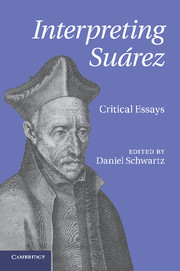Book contents
- Frontmatter
- Contents
- Notes on contributors
- Acknowledgements
- Abbreviations and method of citation
- Chapter 1 Introduction
- Chapter 2 Fundamentals in Suárez's metaphysics: transcendentals and categories
- Chapter 3 The reality of substantial form: Suárez, Metaphysical Disputations xv
- Chapter 4 Suárez on the ontology of relations
- Chapter 5 Suárez's cosmological argument for the existence of God
- Chapter 6 Action and freedom in Suárez's ethics
- Chapter 7 Obligation, rightness, and natural law: Suárez and some critics
- Chapter 8 Suárez on distributive justice
- Chapter 9 Suárez on just war
- Bibliography
- Index
Chapter 6 - Action and freedom in Suárez's ethics
Published online by Cambridge University Press: 05 December 2011
- Frontmatter
- Contents
- Notes on contributors
- Acknowledgements
- Abbreviations and method of citation
- Chapter 1 Introduction
- Chapter 2 Fundamentals in Suárez's metaphysics: transcendentals and categories
- Chapter 3 The reality of substantial form: Suárez, Metaphysical Disputations xv
- Chapter 4 Suárez on the ontology of relations
- Chapter 5 Suárez's cosmological argument for the existence of God
- Chapter 6 Action and freedom in Suárez's ethics
- Chapter 7 Obligation, rightness, and natural law: Suárez and some critics
- Chapter 8 Suárez on distributive justice
- Chapter 9 Suárez on just war
- Bibliography
- Index
Summary
Human action and its place in Suárez's ethics
Fundamental to Suárez's ethics is the idea of actus humani – of fully human actions. These are the properly intentional or deliberate actions that adult humans perform and through which they can exercise the power of freedom. It is these actions by which humans conform to or breach law in its various forms, and on the basis of which they may be deserving of reward or punishment; and it is by these actions, therefore, that humans determine their final salvation or damnation.
Human action is understood by Suárez to consist in a distinctive mode of exercising rationality. But, so understood, the nature of action does not of itself deliver the reality of or constitute the nature of freedom. Freedom is something additional to our capacity for rationality, being a distinctively contingent efficient causal power that we possess as agent-substances. The existence and reality of this power is revealed to us directly through our consciousness – through our awareness of our possession and exercise of the power. And it is from its connection with freedom that action derives its central ethical significance. Our freedom allows us to be subject to a distinctively practical or action-governing normativity of law – a normativity which importantly both helps determine our moral status and directs our actions. Law leaves us in possession of moral rights, but also subject to moral obligations which bind us in the exercise of our freedom. So freedom provides a moral basis not only for moral and political liberty, but also for our liability to coercion and punishment. All these are founded on our subjection, through our rational and free nature, to various kinds of legal jurisdiction, including, most fundamentally, the pre-positive or purely moral jurisdiction involved in natural law.
- Type
- Chapter
- Information
- Interpreting SuárezCritical Essays, pp. 115 - 141Publisher: Cambridge University PressPrint publication year: 2011



